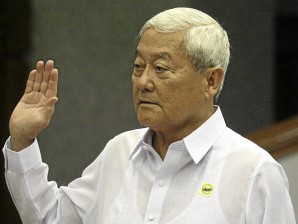Roberto Ongpin calls Sen. Osmeña’s allegation baloney
The camp of businessman Roberto Ongpin on Sunday urged Senator Sergio Osmeña III to “review his arithmetic” after the latter reopened the Senate hearings on the allegedly anomalous transactions between the trade minister of then strongman Ferdinand Marcos and Development Bank of the Philippines (DBP).
In a statement sent through his lawyer, Ongpin—who is traveling abroad—described the senator’s latest allegation that he made as much as P2 billion through insider trading in the shares of Philex Mining Corp. as “baloney.”
“The opening sentence of last Saturday’s news article [in the Philippine Daily Inquirer] about the resumption of the Senate probe of DBP’s loans to Ongpin sums it all: ‘From behest loans, to insider trading, to market manipulation and now, short-swing profits,’” the statement said.
Short-swing profits are earned within six months of a trade, including those made from the sale of securities followed by their repurchase within six months.
Insider trading happens when someone makes an investment decision to make a profit or avoid a loss based on information that is not available to the general public.
Article continues after this advertisementOngpin said that having failed to substantiate the allegations of behest loans, insider trading and market manipulation, his detractors “have come up with another yet-to-be-proved allegation” that he illegally earned short-swing profits when he sold Philex shares to the group of businessman Manuel V. Pangilinan.
Article continues after this advertisementOngpin said the previous allegations of irregularities in the granting of the loans by DBP to companies he owned were baseless.
“They are beating a dead horse,” Ongpin said, pointing out that no less than the Bangko Sentral ng Pilipinas (BSP) cleared the transactions when its deputy governor, Nestor Espenilla Jr., testified during the Senate hearings that there was nothing irregular about the granting of the loans.
The Monetary Board of the BSP approved recently his acquisition of a controlling interest in Philippine Bank of Communications—something bank regulators would not have done had they reason to believe he was engaged in illegal activities, Ongpin said.
Last year, the Senate committee on banks and financial institutions, chaired by Osmeña, looked into two loans—one for P150 million and another for P510 million—that DBP extended to Ongpin, who used the bulk of the money to buy from the government bank 50 million Philex shares for P12.50 each in 2009.
Osmeña called the loans “wang-wang (siren) loans” because they were approved in record time.
Ongpin would later buy more Philex shares for P19.25 each.
Osmeña said Ongpin earned hefty profits from the block sale of 452,088,160 Philex shares to Pangilinan’s group at P21 per share in December 2009, giving the group a controlling stake in the country’s largest gold and copper mining firm. The transaction cost P9.49 billion.
An investigation by the Securities and Exchange Commission showed that Ongpin resigned as director and vice chair of Philex Mining on Dec. 7, 2009, when the sale of Philex shares to Pangilinan at P21 each was finalized.
Ongpin’s exit from Philex was disclosed to the Philippine Stock Exchange on Dec. 8, 2009.
DBP’s banner year
Ongpin pointed out that DBP’s participation in transactions between Philex and himself allowed the government bank to earn “huge profits, resulting in a banner year for 2009.”
He also dismissed the allegation that he earned short-swing profits from the deal, saying his detractors “clearly fail to understand the reason behind [its] prohibition as provided in the Securities Regulation Code.”
“The prohibition against short-swing profits is meant to curtail the unfair use of company information by corporate officers in their trading of the company’s shares to the detriment of the company itself and the investing public,” he said.
In the case of Philex in 2009, the trade between him and Pangilinan’s First Pacific group was not detrimental to the mining firm, Ongpin said. The transaction, he noted, actually led to the further growth of the company.
This is supported by the fact that Philex, as a company, decided not to file a case for the recovery of short-swing profits against him, Ongpin said.
‘Aboveboard’
“It appears that in the company’s own estimation, there were no short-swing profits made as the transactions were aboveboard, prejudiced no one, and as a matter of fact were beneficial to the company,” Ongpin said.
“The charges that I earned P2 billion in short-swing profits clearly have no basis,” he added. “And it would not hurt for the good senator to review his arithmetic.”
Ongpin said that he would not be surprised if—after this latest allegation fails—his detractors would “come up with another trumped-up allegation in their continuing effort to persecute” him.
Ongpin has been sued by lawyer Mario Ongkiko, a minority Philex shareholder who is demanding that the businessman return P412 million in short-swing profits he allegedly made through his purchase of DBP’s Philex shares.
